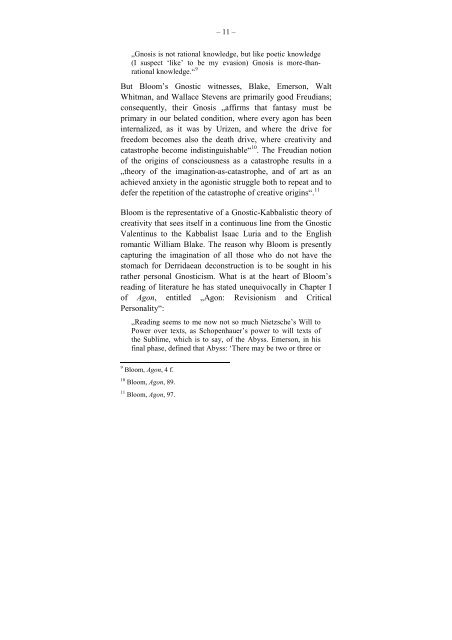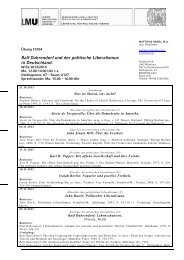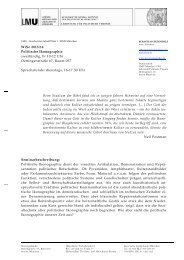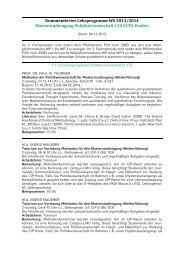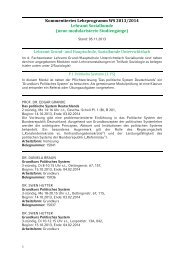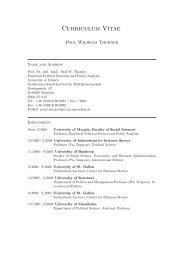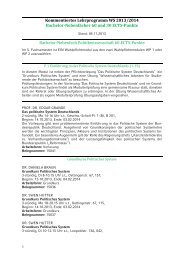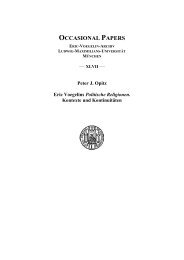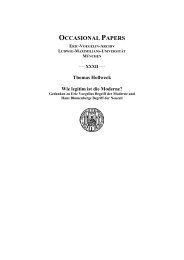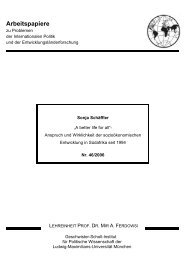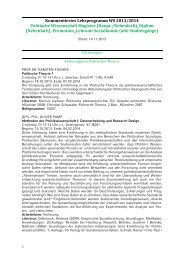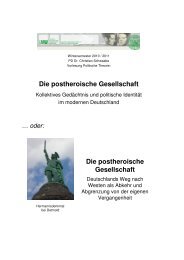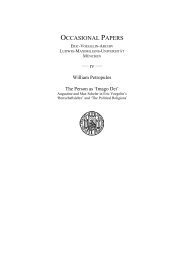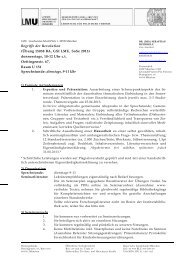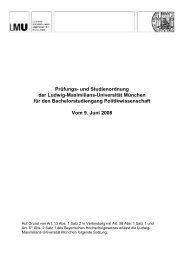THOMAS HOLLWECK is Associate Professor of German at
THOMAS HOLLWECK is Associate Professor of German at
THOMAS HOLLWECK is Associate Professor of German at
Create successful ePaper yourself
Turn your PDF publications into a flip-book with our unique Google optimized e-Paper software.
– 11 –<br />
„Gnos<strong>is</strong> <strong>is</strong> not r<strong>at</strong>ional knowledge, but like poetic knowledge<br />
(I suspect ‘like’ to be my evasion) Gnos<strong>is</strong> <strong>is</strong> more-thanr<strong>at</strong>ional<br />
knowledge.“ 9<br />
But Bloom’s Gnostic witnesses, Blake, Emerson, Walt<br />
Whitman, and Wallace Stevens are primarily good Freudians;<br />
consequently, their Gnos<strong>is</strong> „affirms th<strong>at</strong> fantasy must be<br />
primary in our bel<strong>at</strong>ed condition, where every agon has been<br />
internalized, as it was by Urizen, and where the drive for<br />
freedom becomes also the de<strong>at</strong>h drive, where cre<strong>at</strong>ivity and<br />
c<strong>at</strong>astrophe become ind<strong>is</strong>tingu<strong>is</strong>hable“ 10 . The Freudian notion<br />
<strong>of</strong> the origins <strong>of</strong> consciousness as a c<strong>at</strong>astrophe results in a<br />
„theory <strong>of</strong> the imagin<strong>at</strong>ion-as-c<strong>at</strong>astrophe, and <strong>of</strong> art as an<br />
achieved anxiety in the agon<strong>is</strong>tic struggle both to repe<strong>at</strong> and to<br />
defer the repetition <strong>of</strong> the c<strong>at</strong>astrophe <strong>of</strong> cre<strong>at</strong>ive origins“. 11<br />
Bloom <strong>is</strong> the represent<strong>at</strong>ive <strong>of</strong> a Gnostic-Kabbal<strong>is</strong>tic theory <strong>of</strong><br />
cre<strong>at</strong>ivity th<strong>at</strong> sees itself in a continuous line from the Gnostic<br />
Valentinus to the Kabbal<strong>is</strong>t Isaac Luria and to the Engl<strong>is</strong>h<br />
romantic William Blake. The reason why Bloom <strong>is</strong> presently<br />
capturing the imagin<strong>at</strong>ion <strong>of</strong> all those who do not have the<br />
stomach for Derridaean deconstruction <strong>is</strong> to be sought in h<strong>is</strong><br />
r<strong>at</strong>her personal Gnostic<strong>is</strong>m. Wh<strong>at</strong> <strong>is</strong> <strong>at</strong> the heart <strong>of</strong> Bloom’s<br />
reading <strong>of</strong> liter<strong>at</strong>ure he has st<strong>at</strong>ed unequivocally in Chapter I<br />
<strong>of</strong> Agon, entitled „Agon: Rev<strong>is</strong>ion<strong>is</strong>m and Critical<br />
Personality“:<br />
„Reading seems to me now not so much Nietzsche’s Will to<br />
Power over texts, as Schopenhauer’s power to will texts <strong>of</strong><br />
the Sublime, which <strong>is</strong> to say, <strong>of</strong> the Abyss. Emerson, in h<strong>is</strong><br />
final phase, defined th<strong>at</strong> Abyss: ‘There may be two or three or<br />
9 Bloom, Agon, 4 f.<br />
10 Bloom, Agon, 89.<br />
11 Bloom, Agon, 97.


